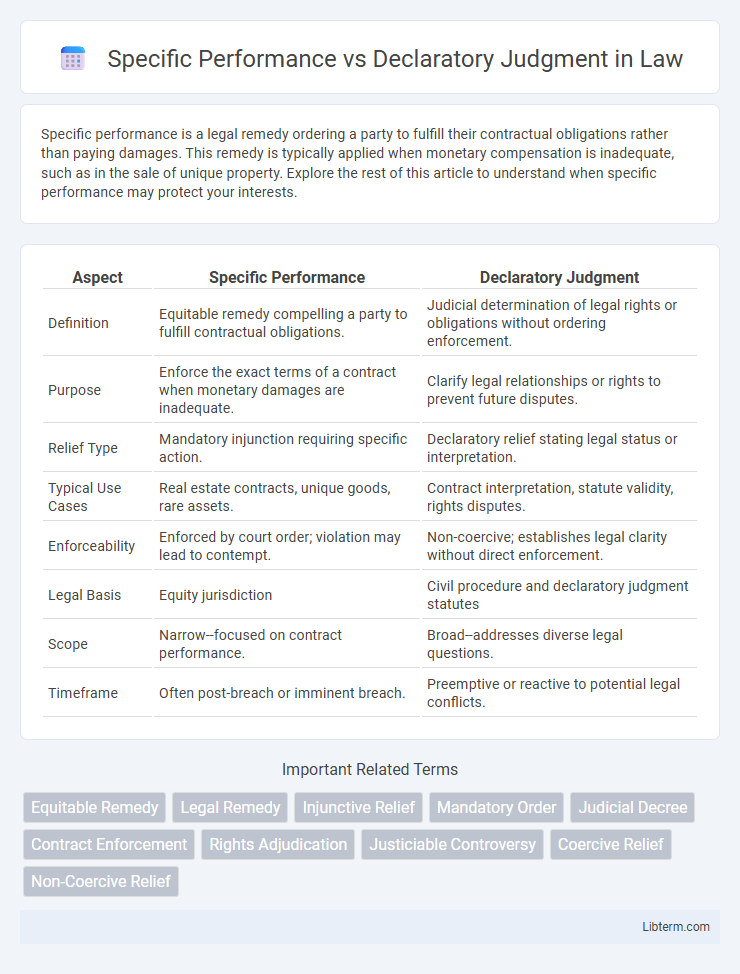Specific performance is a legal remedy ordering a party to fulfill their contractual obligations rather than paying damages. This remedy is typically applied when monetary compensation is inadequate, such as in the sale of unique property. Explore the rest of this article to understand when specific performance may protect your interests.
Table of Comparison
| Aspect | Specific Performance | Declaratory Judgment |
|---|---|---|
| Definition | Equitable remedy compelling a party to fulfill contractual obligations. | Judicial determination of legal rights or obligations without ordering enforcement. |
| Purpose | Enforce the exact terms of a contract when monetary damages are inadequate. | Clarify legal relationships or rights to prevent future disputes. |
| Relief Type | Mandatory injunction requiring specific action. | Declaratory relief stating legal status or interpretation. |
| Typical Use Cases | Real estate contracts, unique goods, rare assets. | Contract interpretation, statute validity, rights disputes. |
| Enforceability | Enforced by court order; violation may lead to contempt. | Non-coercive; establishes legal clarity without direct enforcement. |
| Legal Basis | Equity jurisdiction | Civil procedure and declaratory judgment statutes |
| Scope | Narrow--focused on contract performance. | Broad--addresses diverse legal questions. |
| Timeframe | Often post-breach or imminent breach. | Preemptive or reactive to potential legal conflicts. |
Introduction to Specific Performance and Declaratory Judgment
Specific performance is an equitable remedy compelling a party to fulfill contractual obligations, typically used when monetary damages are insufficient to resolve the breach. Declaratory judgment, on the other hand, is a legal determination that clarifies the rights and duties of parties without ordering any specific action or awarding damages. Both remedies serve distinct purposes in contract law, with specific performance enforcing precise actions and declaratory judgment providing legal clarity to prevent future disputes.
Defining Specific Performance in Legal Terms
Specific performance is a legal remedy that compels a party to fulfill their contractual obligations rather than paying monetary damages. It is typically enforced in cases involving unique goods or real estate where monetary compensation is insufficient. Courts grant specific performance to ensure the injured party receives exactly what was promised under the contract.
Understanding Declaratory Judgment
Declaratory judgment is a legal determination by a court that clarifies the rights, duties, or obligations of parties involved in a dispute without ordering any specific action or awarding damages. It serves to resolve uncertainty and prevent future litigation by providing a binding interpretation of contracts, statutes, or other legal relationships. Unlike specific performance, which compels a party to fulfill contractual obligations, declaratory judgment focuses solely on affirming legal status or rights.
Key Differences Between Specific Performance and Declaratory Judgment
Specific performance compels a party to fulfill contractual obligations, enforcing exact terms agreed upon, while declaratory judgment merely clarifies legal rights or obligations without enforcing action. Specific performance is an equitable remedy often applied in unique contract cases like real estate, whereas declaratory judgment resolves legal uncertainties without ordering specific conduct. The key difference lies in enforcement, with specific performance mandating action and declaratory judgment providing a legal determination.
Legal Requirements for Specific Performance
Specific performance requires the plaintiff to prove the existence of a valid contract, the inadequacy of monetary damages as a remedy, and the feasibility of enforcing the court order. Courts demand clear, definite terms within the contract and typically avoid specific performance in cases involving personal services or where supervision would be impractical. Unlike declaratory judgment, which merely declares rights or legal relationships without enforcing action, specific performance compels a party to fulfill contractual obligations as agreed.
Criteria for Granting Declaratory Judgment
Declaratory judgment is granted when an actual controversy exists between parties regarding their legal rights or obligations, requiring the court to clarify the issue without ordering any enforcement or damages. The plaintiff must demonstrate a justiciable controversy with a substantial likelihood that a determination will resolve uncertainty and prevent future litigation. Courts evaluate factors such as the immediacy, reality, and practical impact of the dispute before issuing declaratory relief.
Situations Favoring Specific Performance
Situations favoring specific performance typically arise in contract disputes involving unique goods or properties, such as real estate or rare collectibles, where monetary damages are inadequate. Courts grant specific performance when the subject matter is irreplaceable or when the buyer cannot obtain a substitute in the market. This remedy ensures the party receives exactly what was promised, enforcing the precise terms of the contract rather than merely compensating with money.
When to Seek a Declaratory Judgment
Seek a declaratory judgment when legal clarity or interpretation of rights and obligations under a contract is needed without demanding immediate enforcement or damages. This remedy is ideal for resolving disputes proactively, preventing future conflicts by establishing legal status or relationships. Courts grant declaratory judgments to clarify uncertainties, making them essential in cases with contested legal questions or ambiguous contract terms.
Judicial Discretion and Limitations
Judicial discretion in specific performance allows courts to enforce contracts when monetary damages are inadequate, yet it is limited by factors like feasibility, fairness, and the uniqueness of the subject matter. In contrast, declaratory judgments provide courts a less intrusive remedy by defining legal rights without compelling action, thus avoiding equity considerations that restrict specific performance. Courts exercise cautious judgment to maintain balance between enforcing obligations and respecting practical and equitable limitations inherent in each remedy.
Practical Implications in Contract Disputes
Specific performance enforces the exact terms of a contract, compelling a party to fulfill their obligations, which is particularly effective in cases involving unique goods or real estate where monetary damages are inadequate. Declaratory judgment, by contrast, provides a court's interpretation of contractual rights and obligations without ordering any action, helping parties clarify uncertainties before or during disputes. The choice between these remedies affects strategic decisions in contract disputes, influencing enforcement, negotiation leverage, and the timeline for resolution.
Specific Performance Infographic

 libterm.com
libterm.com